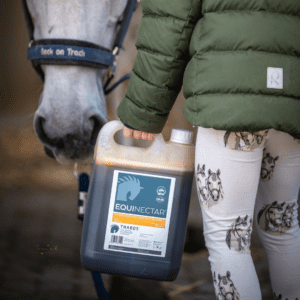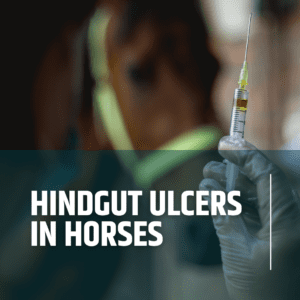
Ben Nedas
Chief Commercial Officer
Gut microbiota play a role in performance and welfare of horses - study review
01
Introduction
In the realm of equine health and performance, the role of gut microbiota has emerged as a significant area of study. The paper titled "Priming for welfare: gut microbiota is associated with equitation conditions and behavior in horse athletes" provides a comprehensive exploration of this topic. The study's purpose was to investigate the relationship between gut microbiota, equitation conditions, and the behaviour of horse athletes. The researchers aimed to uncover whether changes in the gut microbiota could be associated with changes in the behaviour and performance of horses.
The study is well-constructed and robust for several reasons. First, it utilises a large cohort of 185 healthy horses, which enhances the statistical power and reliability of the findings. The larger the sample size, the more confident we can be that the results are not due to chance.
Second, the horses were reared in similar conditions over a period of eight months, which helps to control for environmental variables that could potentially influence the gut microbiota. This allows for a more accurate assessment of the impact of specific factors such as diet and training.
Third, the study is peer-reviewed, which is a critical factor in ensuring the quality and reliability of scientific research. Peer review involves independent experts in the field scrutinising the study for its methodology, data analysis, and conclusions. This process helps to ensure that the research is conducted to the highest standards and that the findings are valid.
Lastly, the study employs advanced techniques for analysing the gut microbiota, including 16S rRNA gene sequencing. This allows for a detailed examination of the bacterial communities in the gut and how they change over time.
In summary, the study's large sample size, controlled conditions, peer-review process, and advanced analytical techniques all contribute to its robustness and the validity of its findings. The insights gained from this research could have significant implications for how we manage and train horse athletes for optimal health and performance.
Next, I will delve into the specific findings of the study.
02
Findings
The study yielded several key findings that deepen our understanding of the relationship between gut microbiota and equine behaviour and performance.
1. Gut Microbiota and Behavior: The researchers found a significant correlation between the composition of gut microbiota and the behaviour of horses. Specifically, horses with a higher diversity of gut microbiota exhibited fewer stress-related behaviours. This suggests that the gut microbiota may have a direct influence on the behaviour of horses, potentially through the gut-brain axis. This axis is a communication network linking the central nervous system with the gastrointestinal tract, mediated by the gut microbiota. The study's findings lend support to the existence of this axis in horses.
2. Equitation Conditions and Gut Microbiota: The study also found that equitation conditions, such as the type of training and diet, can significantly influence the gut microbiota. Horses that were trained more intensively and fed a high-starch diet had a lower diversity of gut microbiota. This decrease in diversity was associated with an increase in stress-related behaviours. These findings highlight the importance of diet and training in maintaining a healthy gut microbiota and, by extension, a healthy mental state in horses.
3. Temporal Dynamics of Gut Microbiota: The researchers discovered that the gut microbiota of horses changes over time, with certain bacterial genera becoming more or less abundant. These changes were associated with changes in the behaviour of the horses, further emphasising the potential influence of gut microbiota on equine behaviour.
4. Lactic Acid Producing Bacteria: The paper discusses how a low fibre but high starch diet can lead to an increase in the concentration of amylolytic bacteria and the relative abundance of Succinivibrionaceae, which are associated with the production of lactic acid in the gut. This shift in the gut microbiota was found to correlate with an increase in stress-related behaviours in horses.
These findings underscore the complex interplay between gut microbiota, diet, training, and behaviour in horses. They suggest that the gut microbiota is not just a passive player in equine health and performance, but an active participant that can be influenced by diet and training, and in turn, influence behaviour. This opens up new avenues for improving equine welfare and performance through targeted interventions aimed at modulating the gut microbiota.
In the next section, I will discuss the potential implications of these findings and propose ways that EquiNectar, a digestive enzyme supplement, could be used as a strategy to improve the behaviour and performance of horses.
03
Conclusion
The findings of the study open up promising avenues for improving equine welfare and performance. One such avenue could be the strategic use of digestive enzyme supplements like EquiNectar. Here's how EquiNectar could potentially be utilised based on the study's findings:
1. Promoting Gut Microbiota Diversity: The study found that horses with a more diverse gut microbiota exhibited fewer stress-related behaviours. EquiNectar could potentially help promote this diversity by providing enzymes that aid in the digestion of a wide range of food components, thereby supporting a diverse range of gut bacteria. Our pilot studies have shown in practice that Equinectar does increase the number of different types of bacterial species.
2. Balancing the Diet: The study also found that a high-starch diet was associated with a decrease in gut microbiota diversity and an increase in stress-related behaviours. EquiNectar could help balance the effects of such a diet by aiding in the digestion of starches, potentially reducing their impact on the gut microbiota.
3. Reducing Lactic Acid Production: The paper mentions that a high-starch diet can lead to an increase in bacteria that produce lactic acid, which was associated with stress-related behaviours. By aiding in the digestion of starches, EquiNectar could potentially reduce the amount of substrate available for these bacteria, thereby reducing lactic acid production.
4. Supporting the Gut-Brain Axis: The study suggests that the gut microbiota may influence the behaviour of horses through the gut-brain axis. By promoting a healthy and diverse gut microbiota, EquiNectar could potentially support the functioning of this axis, leading to improvements in behaviour and performance. It’s interesting that when we looked at any correlations between supplementing horses’ diets in this way and their subsequent behaviour, we found that horses were calmer on Equinectar.
However, it's important to note that while these are potential ways that EquiNectar could be used, more research would be needed to confirm their effectiveness. It would also be important to consider other factors that can influence the gut microbiota and behaviour of horses, such as their overall diet, exercise regime, and living conditions.
In conclusion, the study provides evidence that the gut microbiota plays a role in the behaviour and performance of horses and suggests that manipulating the gut microbiota could be a potential strategy for improving horse welfare and performance. EquiNectar, as a digestive enzyme supplement, could potentially play a key role in this strategy. However, this is a complex area of research, and more studies are needed to fully understand the relationship between the gut microbiota and horse behaviour, and to develop effective strategies for microbiota manipulation.
ABOUT EQUINECTAR
Description
EquiNectar® is a natural feed supplement, that is scientifically proven to:
- Re-balance your horse’s gut bacteria
- Help your horse maximise benefits from its feed
- Improve your horse’s condition
More information
EquiNectar® is produced by Tharos Ltd in the UK. It is a natural source of digestive enzymes and contains only the following ingredients:
- Our patented enzyme rich malt extract
- Medium chain triglycerides (from coconut oil)
- Potassium sorbate
For more details of the enzymes within EquiNectar® take a look at the ingredients and enzymes page.
How to feed
Simply add EquiNectar® to your horse's daily feed, using the Feeding Rate chart to determine the correct amount.
For detailed instructions about how to introduce EquiNectar, please read the comprehensive Feeding Guide page.





